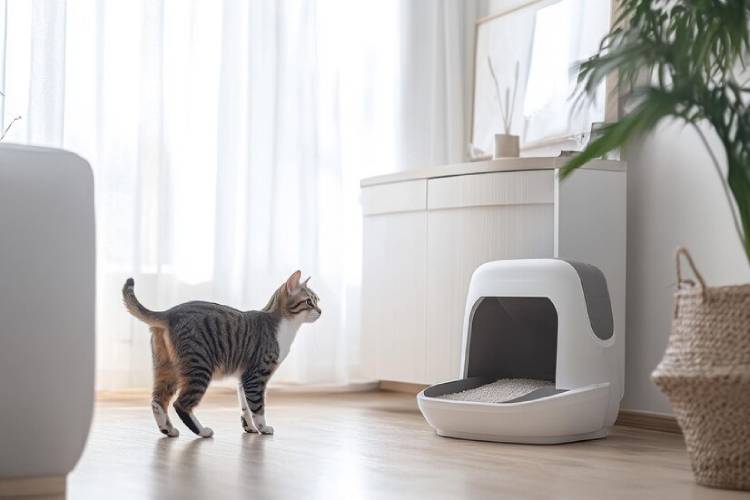If you’re a cat owner dealing with your cat peeing outside the litter box, you’re not alone. While frustrating, this behavior can be triggered by a variety of issues ranging from medical to behavioral. Understanding the causes and finding the right solutions will help your cat and restore peace in your home. In this guide, we’ll explore common reasons why cats pee outside the litter box and practical solutions to address them.
Medical Issues: A Hidden Cause for Cats Peeing Outside the Litter Box
One of the primary reasons your cat may be urinating outside the litter box is a medical issue. Conditions such as urinary tract infections (UTIs), kidney stones, or hyperthyroidism can cause discomfort or pain, prompting your cat to avoid the litter box.
For example, if your cat has a UTI, urinating may become painful, leading it to associate the litter box with discomfort and seek an alternative location. Other health concerns such as chronic kidney disease, diabetes, or liver disease can also lead to your cat peeing outside the litter box.
It’s essential to get a thorough examination by a veterinarian if your cat is exhibiting unusual urination habits. The vet can diagnose and treat any underlying health conditions that may be causing your cat’s litter box aversion.
You May Interested: When to Euthanize a Cat with Seizures
Litter Box Issues: A Common but Fixable Problem
Litter box issues are another frequent cause of reasons your cat is peeing. Cats can be very particular about their litter box setup. Some reasons your cat may be avoiding the box include::
- The litter box may be too small or not cleaned frequently enough.
- The litter box location could be inconvenient or too far away, causing your cat to pee outside.
- The type of litter used might not be to your cat’s liking, or the box may be placed in an area with too much foot traffic, making it hard for your cat to access it comfortably.
To prevent reasons why your cat outside of their litter box, make sure the litter box is clean, easily accessible, and appropriately sized. You may also need to try different types of litter to see which one your cat prefers. Many cats are particular about their litter box environment, so experimenting with different setups can help
Stress and Anxiety: Could This Be Why Your Cat Is Peeing Outside the Box?
Cats are highly sensitive creatures, and changes in their environment or routine can trigger stress and anxiety, causing them to pee outside the litter box. Some common stressors include:
- The introduction of a new pet, baby, or even moving to a new home.
- Changes in daily routine, like an owner’s prolonged absence or a new feeding schedule.
- Lack of attention or stimulation can lead your cat to feel neglected.
Providing a calm and stable environment can significantly reduce stress. You can also increase playtime and exercise to help alleviate boredom and anxiety, making your cat feel more comfortable using the litter box.
Behavioral Issues: Understanding Why Your Cat Is Peeing Outside the Litter Box
Sometimes, the issue is purely behavioral. Peeing outside of the litter box can be a way for cats to mark their territory, especially if there are multiple cats in the house or if a new cat has been introduced. This behavior could also be a cry for attention, as your cat may feel neglected or unstimulated.
Additionally, some behavioral problems could be linked to a medical condition, which is one of the reasons why your cat might be peeing outside the litter box. Monitoring your cat’s habits is essential, especially if your cat is peeing everywhere or showing other unusual behaviors. For instance, a lack of exercise or stimulation could lead your cat to act out by peeing outside of the litter box.
Identifying the underlying cause is crucial for resolving these litter box problems.
Identifying the Cause of Litter Box Problems
To determine why your cat is peeing outside the litter box, you’ll need to observe your cat’s behavior closely. Keep a log of when and where your cat urinates outside the litter box. This will help you spot any patterns or triggers. Sometimes, certain factors may make the box hard for your cat to find, or the location might cause your cat to avoid their litter box altogether.
Offering your cat privacy and peace by placing the litter box in a quiet, accessible area can also help. If you can’t pinpoint the cause, consider seeking the help of a veterinarian or animal behaviorist, who can provide insights based on your cat’s health and environment.
Solutions to Stop Your Cat from Peeing Outside the Litter Box
Once you’ve identified the cause, implementing the right solutions is key to stopping the behavior. Below are some effective strategies:
Litter Box Solutions
- Increase the number of litter boxes: A good rule of thumb is to have one more litter box than the number of cats in your home.
- Keep the litter box clean: Scoop the litter daily and clean the entire box weekly to avoid unpleasant odors.
- Try a different type of litter or box: Some cats prefer covered or uncovered boxes, while others might react better to a specific type of litter.
Environmental Solutions
- Provide a calm and stable environment: Make sure your home is free of stressors like loud noises or drastic changes in routine.
- Increase playtime: Engage your cat in regular play sessions to reduce boredom, stress, and anxiety.
- Consider pheromone products: These can help calm your cat and reduce anxiety-driven behaviors, including peeing outside the litter box.
Cleaning and Prevention: How to Stop Your Cat from Re-soiling
Thoroughly cleaning the areas where your cat has peed outside the litter box is crucial to prevent future accidents. Use a pet odor remover specifically designed for cat urine, followed by a disinfectant to eliminate lingering bacteria.
Make sure to clean these areas properly, as cats may return to a spot if they can still smell their previous urine. This can prevent them from associating the litter box with urination.
When to Seek Veterinary Help
If your cat continues to pee outside the litter box despite your efforts, it’s time to consult with a vet. Some signs that you should seek professional help include:
- Sudden changes in urination habits.
- Visible discomfort while urinating.
- The cause of the litter box issues is the inability to be pinpointed after making adjustments.
A veterinarian or animal behaviorist can guide you through more specialized solutions tailored to your cat’s specific needs.
Conclusion
Cats peeing outside the litter box is a common problem, but it’s one that can usually be resolved by addressing medical, environmental, or behavioral issues. Whether your cat is dealing with a health problem, litter box aversion, or stress, understanding the common causes of litter box issues is essential for finding the right solution. Anything that causes your cat to feel uncomfortable,
whether it’s the box itself or external factors, needs to be identified and addressed. By following the tips outlined in this guide, you can create a stress-free environment for your cat and prevent further accidents







